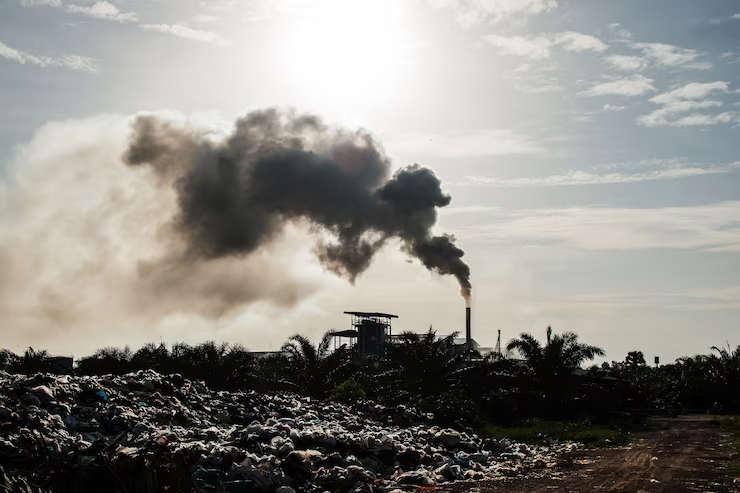- As compared to any other developing or developed country, India must rank way down the pecking order vis-à-vis the way industrial wastes are treated and disposed of. Yes, Indian authorities have made earnest efforts to address the concerns raised by environmentalists, scientists, and other stakeholders about treating hazardous chemical residues. However, it is not rocket science to observe how blatant disregard reigns supreme while adhering to the SOPs for the safe disposal of harmful chemicals. There are several occasions where normal safety procedures are disregarded, tragically costing lives. Regrettably, it usually takes a catastrophe of epic proportions for the government to become alert and take additional action.
 PC: freepik
PC: freepik
- Northern India, especially Punjab, is notoriously known for stubble burning, leading to unlivable pollution-related challenges. The national capital region always finds itself at a crossroads during those stubble-burning months, invariably leading to particulate matter readings perennially breaching alarming levels. It is noted that agricultural stubble burning is hardly Punjab’s only pollution challenge. The toxic gas tragedy that took 11 lives in Ludhiana on Sunday has reminded everyone that the state also has a serious industrial waste problem. Effluents illegally discharged into the sewer took this toll in a matter of minutes. But the city’s many industries, especially dyeing and electroplating units, are accused of making a regular practice of this.
- Worryingly, the problem is not restricted to a few cities but spreads across several cities in India. Small enterprises, often running out of homes, see themselves as unable to afford the mandated effluent and sewage treatments. Urban local bodies that should be facilitating feasible solutions are frequently in violation of the Solid Waste Management Rules 2016, National Green Tribunal Orders, etc. Note that the terms of each of Punjab’s big municipal corporations, viz. Amritsar, Patiala, Jalandhar, and Ludhiana, have ended without an election date in hand. If this is one sign of a high degree of governance dysfunction, another is that urban local bodies make little capital expenditure. In Punjab, municipal corporations’ tax revenue is a measly 0.5% of GDP.

PC: freepik
- The meaning of this should be clearly understood. India’s growth projections are very dependent on the growth of its small enterprises. But if these enterprises are denied crucial support systems, it will mean more and more unlivable cities, as illegal emissions poison air, water, and soil at will. It’s not just urban bodies that need strengthening, though. NGT too needs to step up its act. Without better monitoring of the ground situation and better onboarding of various stakeholders, its words will not do any walking. For now, the polluter must be made to pay. As is its wont, this is often avoided thanks to the by-now-familiar connivance of local bodies. But imposing stringent punishment is an essential curb to act as an effective deterrent. The authorities should step up.





